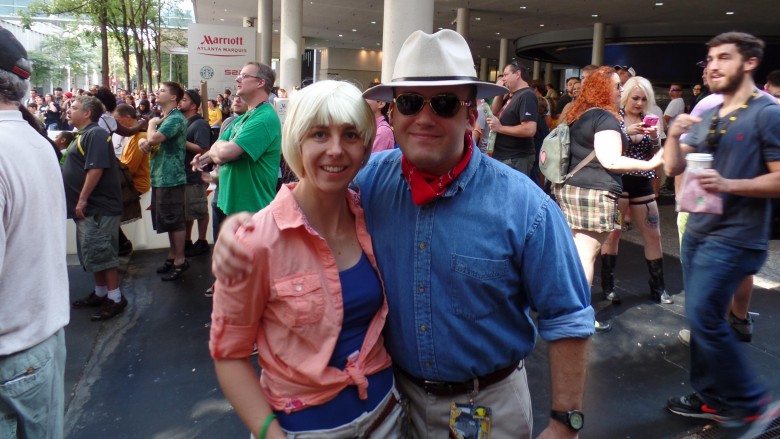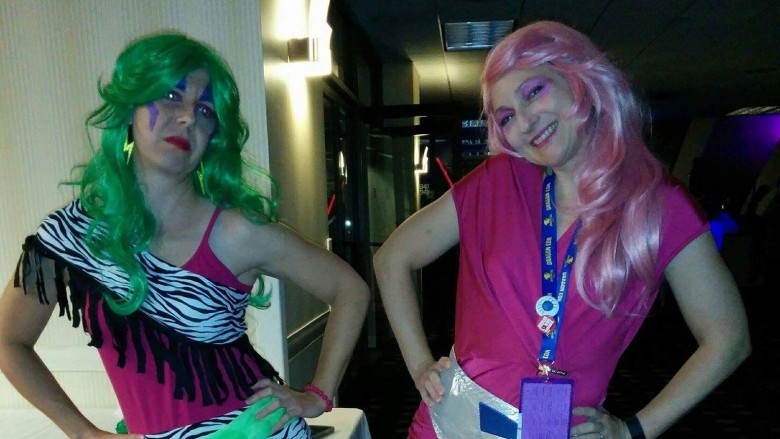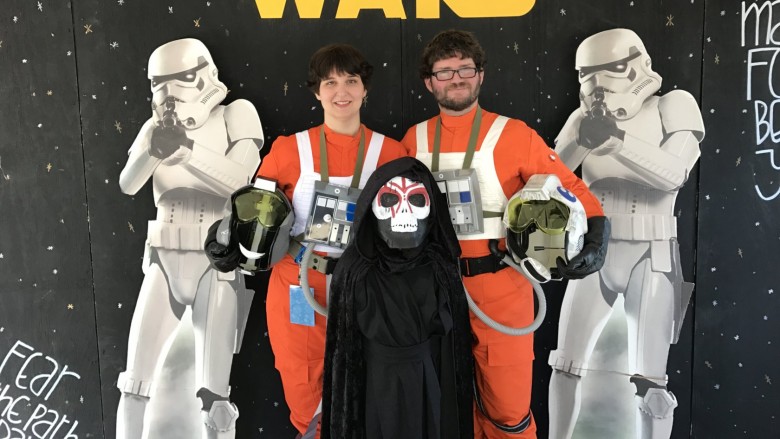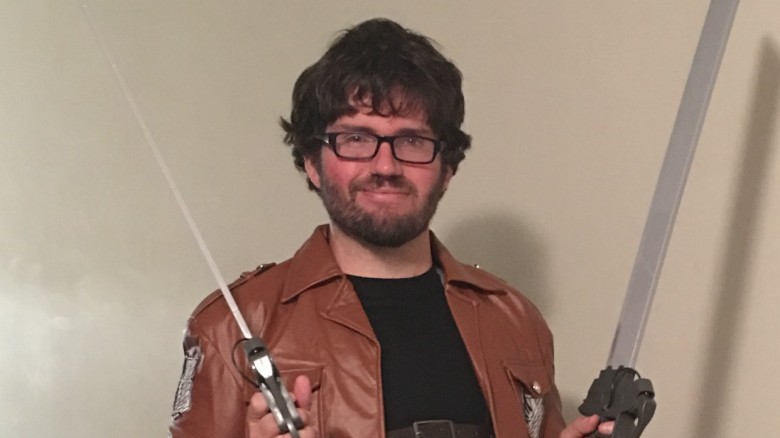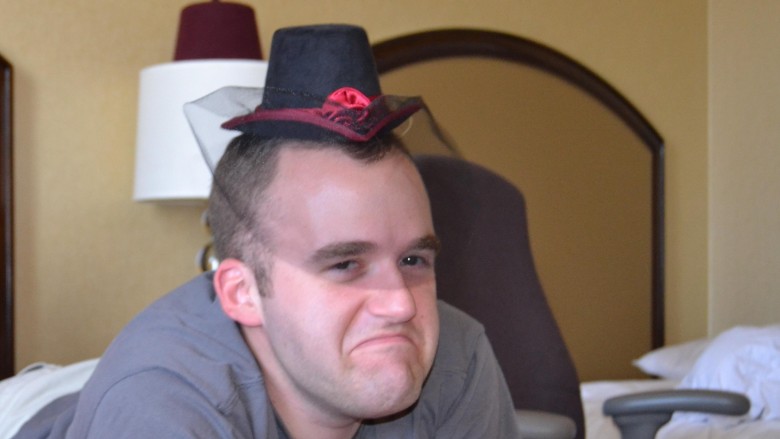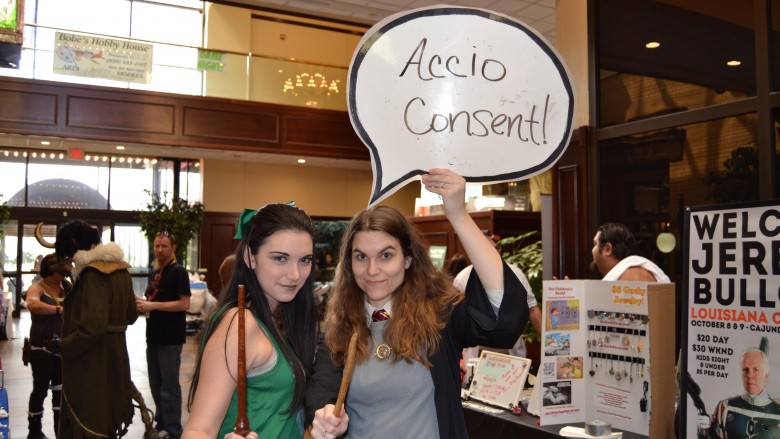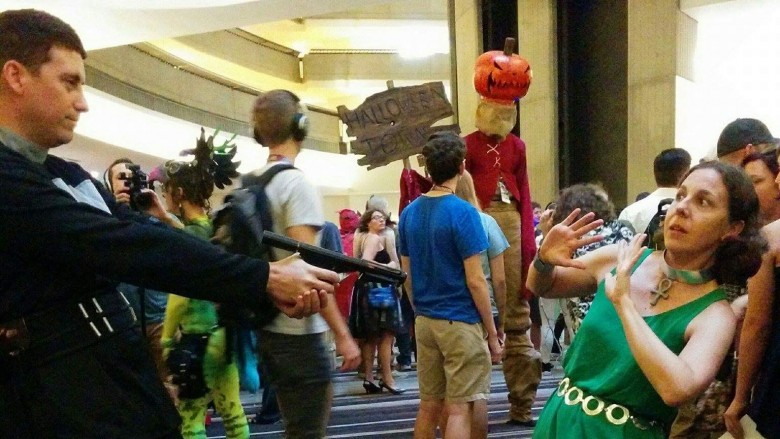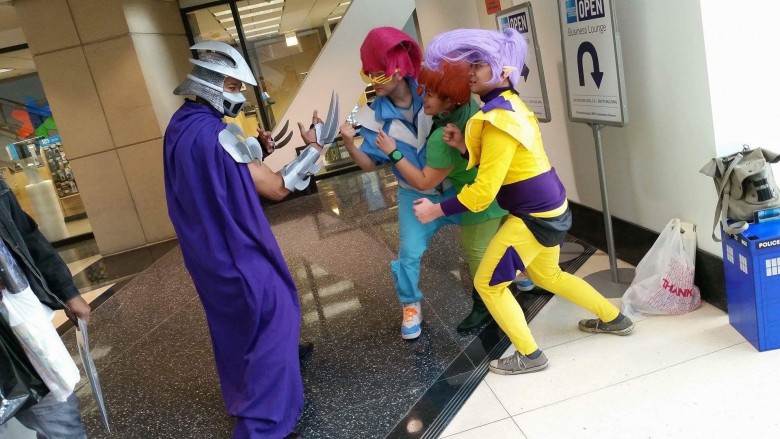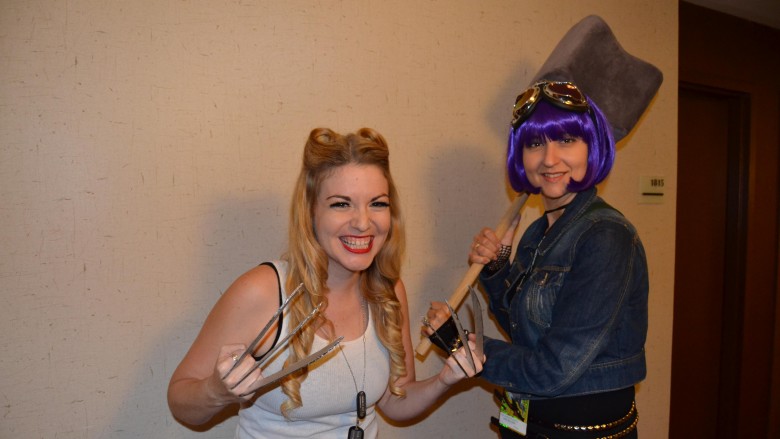Things Everyone Gets Wrong About Cosplay
Cosplay has gone from being a niche habit to being absolutely everywhere. As the number of superhero and sci-fi movies rises every year, there are more and more genre conventions dedicated to all things geek. These conventions range from major events like the San Diego Comic Con to more humble affairs, like the smaller (but ever-growing) Pensacon in Pensacola, Florida.
However, despite how you can't throw a lightsaber without hitting a cosplayer, many people still don't understand much about this phenomenon, or the people who participate in it. In fact, there are a number of myths and outright lies concerning the world of cosplay. In order to peel back the curtain, I've drawn on my experience and that of my friends in order to explore things that everyone gets wrong about cosplay:
It's only for hardcore geeks
This misconception comes from both inside and outside of the cosplay community: it's only for hardcore geeks. From an outsider looking in, it's easy to see where that impression comes from — between the idea of people camping out for days to get into Comic Con, and the sheer detail on some of the costumes you see, it's easy to imagine that this is a hardcore, members-only club. Even within the cosplay community, there's a kind of pushback against the notion of more casual fans joining in.
Of course, this is patently untrue. I have participated in cosplay that was as simple as putting on a Venture Bros. jumpsuit, to as complex as a head-to-toe Ghostbusters costume. And many people have fun even with relatively simple cosplay. My friend Dana described getting her reluctant husband to cosplay as a matter of finding cosplay suited for "comfort," and so he decided on Jurassic Park's Dr. Grant because "it was pretty much normal clothing."
Once he put the simple getup on, though, "he kept tipping his hat at everyone" and clearly enjoyed the experience. And for him, the experience was pretty much enjoying people watching, rocking late-night parties, and checking out the more obscure convention panels. He skipped out on the more traditional celebrity-gawking panels and major events and still had a blast ... and needless to say, he and Dana were quite a hit with Jurassic Park fans!
Everyone involved is really kinky
There has been an interesting phenomenon as cosplay and comic conventions have surged in popularity. Just as more people than ever are getting into the cosplay scene, there's more of a focus than ever before on the sexy side of cosplay. This idea is fanned by groups like the NSFW Suicide Girls and the Cosplay Deviants, who like to show off members dressed in various revealing costumes. Collectively, this gives rise to the idea that everyone into cosplay is very kinky, and that the whole affair basically amounts to a very specialized form of exhibitionism.
Of course, this isn't true for everybody. There are certainly people who like to show off their bodies at conventions, just as there are people who like to show off their bodies during Halloween. Like Halloween, though, most of the people involved are simply getting a kick out of dressing up — titillating crowds or having sex in their complex costumes is usually the last thing on their minds. And even if it is on their minds, it usually doesn't work out too well. As an old Salon article about DragonCon indicated, sex with people in complicated cosplay — such as Stormtroopers — is something that those costumes are not designed for, even when everybody is ready and willing.
Most cosplayers are lonely
Of all the cosplay myths, perhaps the most pervasive is the idea that cosplayers are lonely. This is an extension, of course, of various stereotypes like the Comic Book Guy on The Simpsons. This myth paints a vivid picture of most cosplayers being lonely males who, at best, go to conventions to gawk at women or, at worst, shun the presence of women entirely. And while there are definitely people at conventions that could use a crash course on how to interact with others (romantically or otherwise), the idea of cosplayers as lonely doesn't really hold up at all.
First, there is the problem of sheer logistics. Conventions tend to be expensive, so traveling with a partner or small group is often a financial necessity. Second, cosplay is contagious: speaking for myself, I have spent over half of my life going to conventions, and in that time, have convinced dozens of people to go and, eventually, to dress up. It's tough to be lonely when your group of cosplaying friends grows every year!
Finally, a great many cosplayers are couples. I regularly cosplay with my wife and son, and "couples costumes," in which the couple finds the best pair of genre characters to dress as, has become a bona fide hit, even at the biggest conventions.
Cosplay is only a young person's game
This myth actually has a kernel of truth to it. It's true that a lot of people enter the world of cosplay when they're in high school, and sometimes even earlier — my friend's eleven-year-old daughter absolutely nailed a cosplay of D.Va from Overwatch earlier this year. Thus, young cosplayers become the most noticeable group in the community, because that group is constantly growing.
However, many cosplayers never exactly grow out of it. Speaking for myself, most of my cosplaying friends are in our mid-to-late 30's (over twice the age of the people typically getting into cosplay for the first time), and I have encountered plenty of cosplayers much older. It's not uncommon to find someone using their gray hair to pull off the perfect Obi-Wan or Gandalf cosplay, and one of the best cosplays I've ever seen came from an elderly woman at DragonCon who absolutely ROCKED IT as Lady Olenna from Game of Thrones.
It turns out that older cosplayers are a bit like older gamers: some people have no plans to stop as long as they are having fun.
Cosplayers spend too much on costumes
As cosplay's gotten more popular, it's also gotten more commercial. It seems like there are countless new vendors every month for every cosplay gun, corset, or elaborate uniform you might want. Plus, the website Etsy has made it easier than ever for people to sell what they've created. This has led to a stereotype that most cosplayers spend way too much on their costumes.
Of course, "too much" is very relative. For some people, spending ANY amount of money on a spandex superhero outfit means you have spent too much. However, a great many cosplayers pride themselves on doing as much of the sewing, gluing, and cutting of their costumes as possible. This helps to make the costume feel more personal (they're wearing art that they themselves have created, instead of something "off the rack") and drives the price of the outfit down. In fact, many of the best costumes that you see would cost over one thousand dollars from a commercial retailer, and creative cosplayers have put the whole thing together for a fraction of that price.
This isn't even taking into account the people who get into professional cosplay and make money from it; for them, money spent on a costume is as much of an investment, as a stock purchase might be for you.
Cosplayers don't have other hobbies
Finding out that many cosplayers create their own complex outfits leads to another stereotype: that these people don't have any other hobbies. In its own way, this myth is a bit of a backhanded compliment, as the people who perpetuate it have trouble imagining that the best cosplayers ever have time to do anything other than work on their costumes.
You only have to scratch at the surface of this myth to see how silly it is, though. Cosplay doesn't happen in a vacuum — people are cosplaying their favorite characters from various movies, shows, comics, and video games, and they don't stop enjoying those hobbies to cosplay. In fact, it's likelier for other hobbies (such as gaming) to get in the way of cosplay than cosplay is to get in the way of other hobbies.
Plus, many cosplayers use cosplay as a way to get closer to their favorite characters. As my friend Nina puts it, "cosplay is an avenue I use to embody characters that I admire in some way. Whether it's the strength of a battle-torn hero, the confidence of a seductive supervillain, or the playful nature of a comedic sidekick, I use cosplay to try on characteristics that I might want to emulate in my own life." For her, cosplay is a way of "being able to cross dimensions" between "real life" and that "character's world," instead of having to choose between them.
Cosplayers always want their photo taken
There is actually a really dark issue affecting the cosplay community, and it's one that that has only intensified as cosplay has gotten more popular. This is the idea that all cosplayers want to have their photo taken at all times or even have their costume touched, because they're dressed up and must want attention. This is actually the same logic that many sexual predators use, of course: "if she didn't want anything to happen, she shouldn't have dressed like that!" This has led to the rise of a movement called Cosplay Is Not Consent, that seeks to educate people that — just as they should with sex — they should seek enthusiastic consent before doing anything involving the other person, from touching them to snapping a picture.
So, where does this mindset come from? As my friend Nicky puts it, it has to do with "the pervasive entitlement of what we see and the communication we are willing to use." She sees a direct parallel with this phenomenon and romantic relationships in which one person expects something from another without expressing that desire and then gets upset that they cannot get what they did not ask for. As she puts it, "Dudebros see a hot girl, they want her, they DESERVE her, they don't communicate on any reasonable level, then get mad and sl**-shame or physically take what is theirs, what they 'deserve'." For her, Cosplay is Not Consent is a way to remind people that "Cosplayers don't owe you time, attention, photos, or anything else you think you deserve just because you see them."
Cosplayers are unsuccessful in life
A close corollary to the "most cosplayers are lonely" myth is the idea that most cosplayers are unsuccessful. Both of these myths fit nicely into the broader idea of cosplayers as shut-ins living in their parents' basements. As mentioned earlier, though, the ever-rising cost of the bigger conventions means that it can actually be tough to even attend the things (much less while sporting a great cosplay) without some kind of steady income.
As an example, my group's main bigger convention is DragonCon. This convention isn't as large as, say, San Diego Comic Con, but it still had nearly 80,000 attendees in 2016. In order to stay at a host hotel, it costs over $1000 for four nights. My group still has to pay for convention tickets, gasoline or flights, expensive meals, and hopefully still have some money left over for autographs and merchandise. Being able to regularly go to this and other conventions is made easier by how we have successful, steady jobs.
And while none of us are "in danger" of being rich enough to fight crime dressed as a bat (if only), we're successful enough to regularly engage in our increasingly-expensive (and much less violent than Bruce Wayne's) hobby year after year.
Many cosplayers are unoriginal
Another myth about cosplay that's perpetuated both inside and outside the community, is that most cosplayers are unoriginal. The idea is that, as cosplay and Comic Cons become more mainstream, new cosplayers gravitate towards highly popular characters such as Deadpool or Harley Quinn, usually by buying some kind of costume off the shelf. And while it's true that there are quite a lot of these popular characters being cosplayed (at my last DragonCon, I had to navigate around a Deadpool conga line more than once), calling them unoriginal isn't really fair.
This is because, for many cosplayers, dressing as a popular character provides a unique challenge in standing out. My friend Panda, for instance, decided to cosplay as Harley Quinn back when the first Suicide Squad trailer came out. She immediately rejected the Hot Topic Harley dress that was being sold, and began making her own. She couldn't find designs online at the time, so she had to "source fabrics and create the pattern myself" and then "pick the jewelry (and design from scratch) based on close-ups of the movie stills." Panda ended up throwing herself into learning how to sew, putting together her first 3D-printed gun, and experimenting with cutting and coloring a wig for the first time.
It all paid off: in a convention of nearly 80,000 attendees, she only saw two other people cosplaying in the same outfit. In short, her cosplay process was one of the most original among my friends, and it had the side effect of granting her instant sisterhood with the "fellow character twins" she ran into. And from costumes I've seen lately (ranging from Steampunk Ghostbusters to Jedi Wolverine), there is always a chance to stand out, even with the most popular characters.
Cosplay is full of "fake geek girls"
As cosplay becomes more and more mainstream, so does the prominence of a particular myth: the so-called "fake geek girls." This is a term to accuse women of not being geeky enough to hang with the "real" geeks. To get to the bottom of this, I asked my female cosplaying friends what they thought. Nina said it's nothing more than "a knee-jerk reaction that sets an ever-climbing bar a woman has to meet in order to prove her worthiness to take up a space," and later clarified that a female new to a cosplay or fandom is not "a fake geek" but rather "a new fan."
For Dana, geekery comes in many forms. She says she does certain cosplay because, for instance, she loves "the Riddler's aesthetic ... even though I'm not particularly rabid about anything involving Batman." By the time you spend countless hours to embody a character, it's tough to say you're less of a geek than anyone else. This is something that Barbara has experienced, too, as she has "felt judged at times" because she "doesn't know anything about anime and doesn't know much about superheroes," even though she is an excellent scholar of J.R.R. Tolkien ... which is about as old-school geek as you can get!
Interestingly, this is a myth that is perpetuated by men and women alike. For men, it's standard gatekeeping: the same mentality that caused the Little Rascals to hang their "He-Man woman haters club" sign causes guys to be really protective of what they see as "their" hobby. This high bar of entry means the women who do make it into the clubhouse may adopt the same mentality and, as Panda says, "get protective over the turf when other gals are also entering the territory." Some veteran cosplaying women are bitter over the attention given to young, cute female cosplayers new to the hobby who get lots of male attention ... but, as Nina says, this "just furthers the patriarchal cycle," when we should just be happy that more people have joined our favorite hobby.

